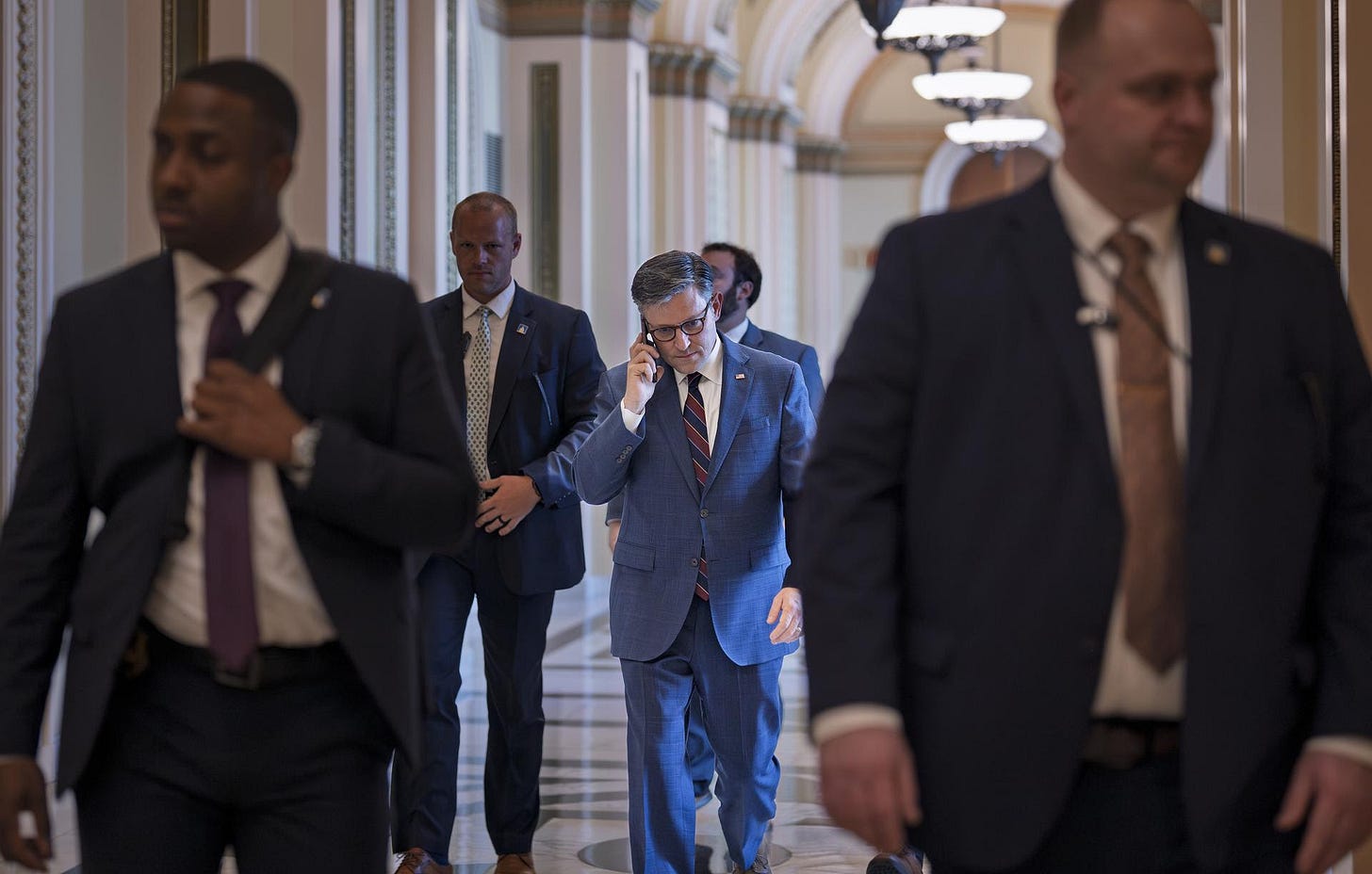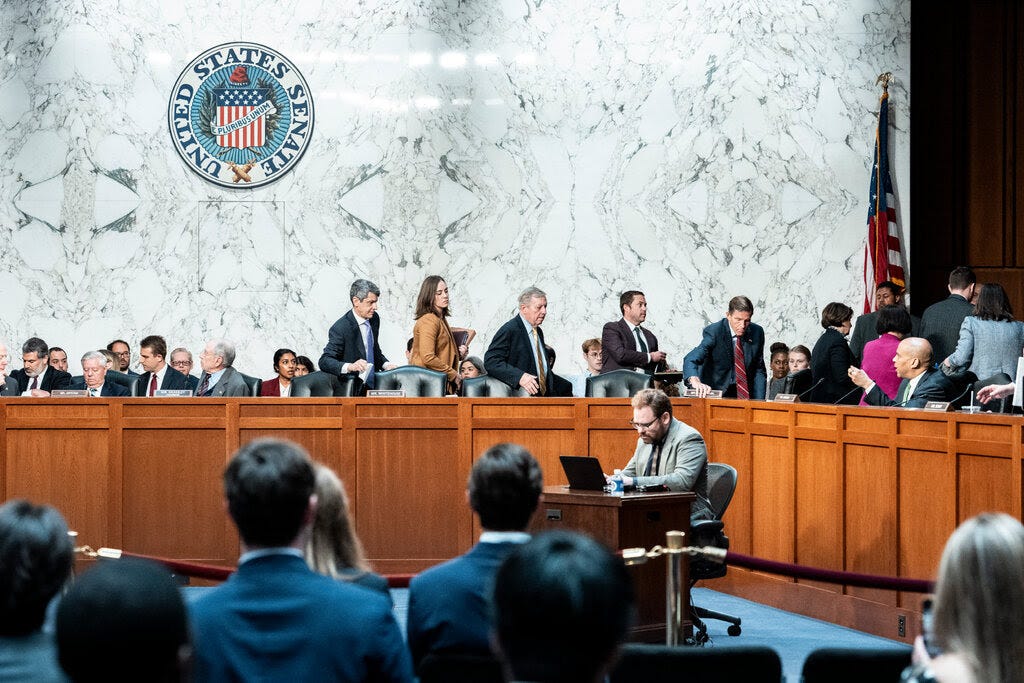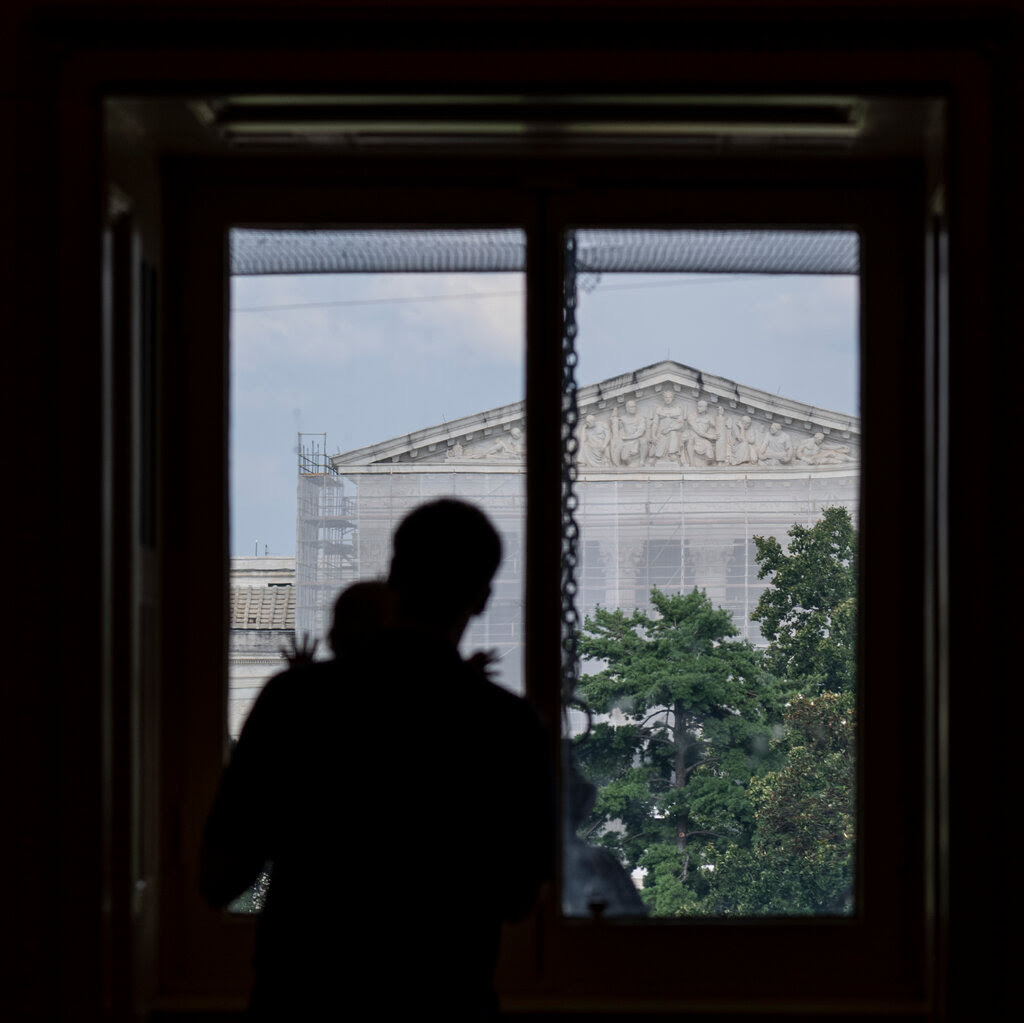Speaker of the House Mike Johnson leaves the chamber at the Capitol in Washington, Thursday. (AP Photo/J. Scott Applewhite)
House gives final approval to Trump’s $9 billion cut to public broadcasting and foreign aid
“The House gave final approval to President Donald Trump’s request to claw back about $9 billion for public broadcasting and foreign aid early Friday as Republicans intensified their efforts to target institutions and programs they view as bloated or out of step with their agenda. Read more.
Why this matters:
The vote marked the first time in decades that a president has successfully submitted such a rescissions request to Congress, and the White House suggested it won’t be the last. Some Republicans were uncomfortable with the cuts, yet supported them anyway, wary of crossing Trump or upsetting his agenda. The House passed the bill by a vote of 216-213. It now goes to Trump for his signature.” [AP News]
President Donald Trump threatened to sue the Wall Street Journal.
“Why? It reported he contributed a drawing of a naked woman to Jeffrey Epstein’s birthday album in 2003. Trump made the threat after ordering the release of some Epstein files.
How close were Trump and Epstein? We broke down their history here. They had a relationship, but no evidence has linked Trump to the late sex offender’s crimes.”
Read this story at Washington Post
Trump denies report he wrote Epstein lewd 50th birthday letter
“President Donald Trump denied on social media a report in the Wall Street Journal that claims he wrote a letter to Jeffrey Epstein for Epstein's 50th birthday. Shortly afterward, Trump announced in another social media post that he is directing Attorney General Pam Bondi to produce more Epstein documents amid public clamor for the records.
How we got here: Controversy around the Trump administration's handling of records involving the convicted sex offender is reaching a fever pitch. The administration's attempt to close the book on Epstein has enflamed parts of the MAGA base, who have speculated about a potential Epstein ‘client list’ that the government is shielding from public view.
•Trump says ‘not the way I talk’: Trump's alleged birthday letter was part of a leather-bound birthday book with dozens of other letters that was presented to Epstein in 2003, the Journal wrote. The Trump letter ends with ‘Happy Birthday — and may every day be another wonderful secret,’ according to the Journal. Trump's signature on the letter, which was written in the form of text inside a hand-drawn outline of a nude woman, is ‘a squiggly 'Donald' below her waist, mimicking pubic hair,’ the Journal wrote.” [USA Today]
“President Donald Trump's administration will ask a court to allow the release of grand jury testimony in the case of deceased convicted sex offender Jeffrey Epstein, after some of his supporters reacted in fury to a report concluding there was no evidence to support long-running theories about his case.” [Reuters]
Trump won’t recommend a special prosecutor in Epstein case, Leavitt says
“White House press secretary Karoline Leavitt on Thursday said President Donald Trump would not recommend a special prosecutor in the Jeffrey Epstein case, despite Republicans’ growing frustration around the administration’s handling of the investigation.
Leavitt said, however, that Trump has called for Attorney General Pam Bondi, the Department of Justice and the FBI to ‘put forward’ any additional ‘credible evidence in regards to Jeffrey Epstein's crimes.’
‘The president would not recommend [a] special prosecutor in the Epstein case. That's how he feels,’ Leavitt told the media from the briefing room podium.
Though the Justice Department and FBI concluded earlier this month that there was no evidence that Epstein had a list of clients or was murdered in his jail cell, Trump supporters have continued to express frustration over the administration’s decision not to release additional information regarding the disgraced financier’s death.” [POLITICO]
Haiyun Jiang/The New York Times
Emil Bove’s Nomination to Appeals Court Advances After Democrats Walk Out
“Republicans on the Senate Judiciary Committee unanimously approved Bove’s nomination after Democrats on the panel stormed out. The vote was a prelude for what is expected to be an even more intense battle on the Senate floor.”
Follow live updates at New York Times
Emil Bove
“Republicans on the Senate Judiciary Committee voted on Thursday to advance the nomination of Emil Bove, President Trump’s former personal attorney, to a federal judgeship. The decision came over the loud protests of Democrats who walked out of the committee proceedings. Bove’s nomination has been contentious. Earlier this week, more than 75 former federal and state judges called on the panel to reject Bove, saying his ‘egregious record of mistreating law enforcement officers, abusing power, and disregarding the law itself disqualifies him for this position.’ In June, a whistleblower letter from a terminated DOJ employee alleged that Bove and other top officials intended to ignore court orders and mislead federal judges. Bove rebuffed such claims during his confirmation hearing.” [CNN]
© The Associated Press | Alex Brandon
Trump’s big legislative week, and some warnings
“In the battle over President Trump’s spending priorities, Republicans say they’re running the table, leaving Democratic lawmakers and a tiny band of GOP critics in the dust.
Passage of Trump's gargantuan agenda otherwise known as the One Big Beautiful Bill Act? Check. Cancellation this week of $9 billion in already enacted appropriations opposed by the president (the first such successful clawback since 1999)? Check. Historic passage of crypto legislation? Check. A Senate sprint to confirm controversial Trump nominees? Check.
‘One year ago, our country was a dead country and now it’s the hottest country anywhere in the world,’ Trump says.
The president and his allies this week celebrated accomplishments, even as the administration wrangled to resolve GOP clashes and to appease MAGA supporters during a conspicuous revolt against the Justice Department while clamoring for more information about Jeffrey Epstein.
Democrats concede Republicans are making the most of their narrow House and Senate majorities while Trump maintains a tight grip on his party and boldly tests his executive sway over the legislative branch — including his clawback of billions of dollars known as rescissions, achieved 24 hours before a statutory deadline.
The cuts will impact about $8 billion in foreign aid and promotion of democracy abroad, including through the former U.S. Agency for International Development, along with $1.1 billion for the Corporation for Public Broadcasting, including PBS and NPR. The House vote late Thursday was 216-213.
‘We’re gonna downsize the scope of government,’ Speaker Mike Johnson (R-La.) said following the vote. ‘Government is too large, it does too many things and it does almost nothing well.’
Democrats may have gained little legislative traction on their side of the aisle to date, but some of their GOP colleagues have joined them in openly chafing at White House expectations.
Senate Majority Leader John Thune (R-S.D.) had to surmount major hurdles inside his conference to succeed in canceling what he described as minor spending that Trump and conservatives opposed.
‘I think $9 billion is a very small amount of money — as I mentioned, one-tenth of 1 percent of all federal spending,’ he told Fox News on Wednesday. ‘But we’ve got to look at all aspects of the federal budget and figure out where we can root out waste, fraud and abuse.’
The Speaker and the White House budget director, each eager to appease fiscal hawks, say more such cancellations of previously approved spending are ahead.
Democrats have suggested they might try to shut down the government in September to showcase their opposition to Trump’s after-the-fact budget deletions.
Some Republicans in Congress worry voters in next year’s midterm contests will punish the party in power. The history of midterm wipeouts supports their caution. The economy has been weakening, according to this year’s data. And Democratic voters appear to be more motivated than Republicans ahead of the elections, new polling shows.
Trump’s supporters approve in general of slashing federal spending and shrinking deficits, but erasing federal and state benefits and services is a political risk, according to bipartisan analysts, if average Americans don’t feel better off when they cast their ballots.
Some lawmakers from red states say they’re having second thoughts about the billions in cuts they helped enact affecting rural hospitals. Those reductions may never happen.
Trump’s job approval is underwater on issues including the economy, immigration, health care and government spending, all of which are top of mind among voters, according to a new poll by The Associated Press-NORC Center for Public Affairs Research. Roughly half of surveyed U.S. adults report the president’s second-term policies have ‘done more to hurt’ them, the survey found.
House Ways and Means Committee member Rep. Kevin Hern (R-Okla.) this week described being called ‘a racist’ by some colleagues because of his support for Medicaid cuts and work verification requirements included in the One Big Beautiful Bill Act.
‘I think work matters in America,’ he said during the Hill Nation Summit. ‘You create jobs so people can work, not be dependent on the government,’ he added.
A few fed-up Republican senators eager in the first six months of Trump’s second term to back his agenda, whether in philosophical solidarity or fearful of political punishment, have suggested their support could be conditional, especially amid future tests of Congress’s power of the purse and if lawmakers can’t dictate how any future rescissions are carried out by the executive branch.
But as The New York Times pointed out, even GOP lawmakers who grouse have repeatedly bowed to the president.
The Washington Post: The administration’s plan to shrink the size of government, in charts.
Sens. Susan Collins (R-Maine) and Lisa Murkowski (R-Alaska), both moderates, opposed the $9 billion rescissions bill this week. Sen. Mitch McConnell (R-Ky.) bucked a procedural step before voting for the final measure. He objected to what he called the administration’s insistence on ‘a blank check.’ Collins says she will seek reelection next year. McConnell is retiring at the end of his term.
‘I suspect we’re going to find out there are some things that we’re going to regret,’ Sen. Thom Tillis (R-N.C.) said Wednesday from the floor. ‘Some second- and third-order effects. And I suspect that when we do, we’ll have to come back and fix it.’ He has clashed with Trump this year and announced he will leave the Senate when his term is up.
Senate Armed Services Committee Chair Roger Wicker (R-Miss.) said he supported the rescissions bill ‘with reservations’ and ‘concerns.’
‘Congress has the power of the purse. The president has the power to enforce. In this situation, there’s a specific amount stated that will be rescinded,’ Wicker said on the Senate floor.
‘But this Congress will not be allowed to choose those specific cuts. That will be done by somebody in the Office of Management and Budget in the White House,’ he continued. ‘And in this situation, it will amount to the House and Senate basically saying: ‘We concede that decision voluntarily to the executive branch.’” [The Hill]
Police violence
“The former police officer who was found guilty of violating the civil rights of Breonna Taylor — when she was shot and killed in her Louisville, Kentucky home during a botched “no-knock” raid in 2020 — will face sentencing on Monday. Although Brett Hankison wasn’t the officer who killed Taylor, he did fire blindly through her window. In a court filing Wednesday, the DOJ asked that Hankison be sentenced to just 1 day in jail. And in Philadelphia, a former police officer who shot and killed a motorist during a traffic stop was sentenced on Thursday and then immediately granted parole. A judge sentenced Mark Dial to 9 1/2 months in jail for voluntary manslaughter in the fatal shooting of 27-year-old Eddie Irizarry — but then granted him parole because he had already been jailed for 10 months following his arrest in 2023. The city’s district attorney and the victim’s family condemned the sentence.” [CNN]
Judge says Trump’s firing of FTC commissioner was illegal
“A federal judge has restored commissioner Rebecca Kelly Slaughter to her role at the Federal Trade Commission, ruling that President Donald Trump’s attempt to fire the Democratic appointee in March was illegal.
The Trump administration said that it would appeal the decision, likely setting up a legal fight that could end in the Supreme Court.”
Read the latest at POLITICO
ICE Is Getting Unprecedented Access to Medicaid Data
BY LEAH FEIGER, MAKENA KELLY, VITTORIA ELLIOTT, AND MATT GILES | 6-MINUTE READ
“A new agreement viewed by WIRED gives ICE direct access to a federal database containing sensitive medical data on tens of millions of Americans, with the goal of locating immigrants.” [Wired]
Trump was diagnosed with chronic venous insufficiency, the White House said.
Trump’s left ankle appeared swollen this week. (Alex Brandon/AP)
“What is it? A mild, chronic illness in which the legs struggle to send blood back to the heart — learn more about it here. The announcement was a rare acknowledgment of Trump’s age.”
Read this story at Washington Post
“The Department of Agriculture said it has fired 70 foreign contract researchers after a national security review intended to secure the US food supply from adversaries including China, Russia, North Korea and Iran.” [Reuters]
“California Governor Gavin Newsom vowed to fight the "illegal" move by Trump's administration to cancel some $4 billion in federal grants for the state's ambitious but much-delayed high-speed rail project.” [Reuters]
Louisiana cancels $3 billion coastal restoration project funded by oil spill settlement
“Louisiana on Thursday canceled a $3 billion repair of its disappearing Gulf coastline, funded by the 2010 Deepwater Horizon oil spill settlement. Read more.
What to know:
The Mid-Barataria Sediment Diversion Project aimed to rebuild upward of 20 square miles of land over a 50-year period in southeast Louisiana to combat sea level rise and erosion on the Gulf Coast. More than 2,000 square miles of land have vanished over the past century, according to the U.S. Geological Survey.
Despite years of studies and reviews, the project grew increasingly imperiled after Gov. Jeff Landry, a Republican, took office last year. Its collapse means that the state could lose out on more than $1.5 billion in unspent funds and may have to repay the $618 million it already used to begin building.
Former Louisiana Rep. Garret Graves, a Republican who once led the state’s coastal restoration agency, said that killing the project was ‘a boneheaded decision’ not rooted in science. ‘It is going to result in one of the largest setbacks for our coast and the protection of our communities in decades,’ Graves said.” [AP News]
INTERNATIONAL
The EU targets Russia’s energy revenue and shadow fleet with new sanctions over Ukraine war
“The European Union approved on Friday a new raft of sanctions against Russia over its war on Ukraine, including a lower oil price cap, a ban on transactions with Nord Stream gas pipelines, and the targeting of more shadow fleet ships, the EU foreign policy chief, Kaja Kallas, said. Read more.
Why this matters:
‘The message is clear: Europe will not back down in its support for Ukraine. The EU will keep raising the pressure until Russia ends its war,’ Kallas said in a statement. Kallas said the measures amount to ‘one of its strongest sanctions packages against Russia to date’ linked to the war, now in its fourth year.
Oil income is the linchpin of Russia’s economy, allowing President Vladimir Putin to pour money into the armed forces without worsening inflation for everyday people and avoiding a currency collapse. A new import ban was also imposed in an attempt to close a loophole allowing Russia to indirectly export crude oil via a number of non-EU countries.
On top of that, the new EU sanctions targeted Russia’s banking sector, with the aim of limiting the Kremlin’s ability to raise funds or carry out financial transactions. Two Chinese banks were added to the list.” [AP News]
U.S. intelligence suggests two Iranian nuclear sites were not “obliterated.”
A satellite image shows a close-up of a crater at the underground Natanz enrichment facility, after it was hit by U.S. airstrikes, near Natanz, Iran, on June 22. (Maxar Technologies/Reuters)
“Last month: The U.S. struck three nuclear facilities in Iran, and Trump claimed they had all been destroyed. A new assessment suggests only one was demolished.
In related news: Israeli strikes hit a church in Gaza yesterday that Pope Francis used to call nightly, killing three people. And these smaller countries are taking a stand against Israel.”
Read this story at Washington Post
New PM in Town
Newly appointed Ukrainian Prime Minister Yulia Svyrydenko attends a session of Ukrainian parliament in Kyiv on July 17.Andrii Nesterenko/AFP via Getty Images
“Ukrainian President Volodymyr Zelensky appointed a new prime minister on Thursday in a cabinet reshuffle aimed at boosting domestic weapons production and prioritizing diplomatic relations with the United States. However, some Ukrainians argue that the announcement does not signal a marked shift in Zelensky’s war ambitions or tactics, as it largely rotates cabinet ministers already in power instead of introducing new faces.
‘We don’t understand the motivation behind this government shake-up,’ said opposition lawmaker Mykola Kniazhytskyi of the European Solidarity party.
Former Economy Minister Yulia Svyrydenko will replace Denys Shmyhal as prime minister, becoming the second woman to hold the position in Kyiv’s history and the first new head of government since Russia launched its full-scale invasion of Ukraine in February 2022. The 39-year-old Svyrydenko gained international recognition in recent months by negotiating the U.S.-Ukraine critical minerals deal, which granted Washington access to Ukrainian rare earths and other natural resources as well as established a jointly managed reconstruction fund for Kyiv.
Alongside promoting Svyrydenko, Zelensky nominated Olga Stefanishyna to become Ukraine’s next ambassador to the United States after the country’s previous representative, Oksana Markarova, angered Republicans last September by having Zelensky visit a weapons factory in the battleground state of Pennsylvania alongside only Democrats.
These moves signal Zelensky’s continued efforts to woo U.S. President Donald Trump in order to secure long-term security guarantees, including weapons shipments. Although U.S. and Ukrainian leaders have not always seen eye to eye, Zelensky maintains that U.S. military support remains one of the most effective ways to counter Russian aggression.
Earlier this week, Trump endorsed a plan to have European allies buy billions of dollars’ worth of U.S. military equipment, including Patriot air defense systems, to send to Ukraine. And on Thursday, top NATO commander Gen. Alexus Grynkewich confirmed that preparations were underway to quickly transfer the missile systems to Kyiv.
Still, Zelensky’s cabinet reshuffle demonstrates that Ukraine is also prioritizing efforts to increase its defense production capabilities at home.
‘We all want peace as soon as possible,’ Zelensky told the Ukrainian parliament on Thursday. ‘At the same time, we all see how difficult it is to maintain sufficient global support, and how many other wars and crises are flaring up around the world, truly scattering global efforts. Therefore, Ukraine needs more of its own strength.’
To ramp up domestic weapons production, Shmyhal, the former prime minister, will become the new defense minister, replacing Rustem Umerov. Shmyhal is expected to work closely with Svyrydenko, who has vowed to make domestic production efforts a top concern of her time in office.
‘Our priorities for the first six months are clear: reliable supply for the army, expansion of domestic weapons production, and boosting the technological strength of our defense forces,’ Svyrydenko posted on social media on Thursday.” [Foreign Policy]
“Landmark defense deal. Germany and the United Kingdom inked a landmark defense treaty on Thursday that includes mutual defense promises and efforts to better coordinate on security matters, including collective European defense and nuclear issues. Berlin does not possess its own nuclear weapons (though it hosts U.S. nuclear weapons within its territory), but it is the third-largest supplier of military hardware to Ukraine and has agreed to increase military spending to 3.5 percent of its GDP by 2029. Thursday’s agreement builds off a deal signed last October that paved the way for joint German-U.K. military exercises and the development of sophisticated weapons.
This is the first time that Germany and the United Kingdom have clinched a new treaty since the end of World War II, and it comes as Berlin is preparing for its most ambitious rearmament since the end of the Cold War. Experts suggest that this renewed cooperation likely comes in response to the emergence of new priorities and concerns for both countries, particularly Russia’s ongoing security threats to the continent as well as the United States’ shift to an “America First” foreign policy.
‘We want to work together more closely, particularly after the United Kingdom’s withdrawal from the European Union’ in 2020, German Chancellor Friedrich Merz said. ‘It is overdue for us to conclude such a treaty with each other.’
Thursday’s agreement also provides greater collaboration on energy development, economic growth, and migration concerns, and it enables easier travel between the two countries, including by allowing British passport-holders to use Germany’s automated passport control system (known as e-gates) when crossing the border.” [Foreign Policy]
“Who protects the Druze? Syrian President Ahmed al-Sharaa accused Israel on Thursday of trying to fracture the country’s tenuous stability by launching strikes at military and government targets in Damascus. Israel maintains that its actions—conducted on Wednesday, just hours before Syria’s security forces and leaders of the Druze religious minority agreed to a cease-fire deal to end days of deadly clashes—were taken to protect the Druze. (Israel also has a sizable Druze population.) However, Sharaa vowed on Thursday to protect the Druze community, adding to a Syrian Foreign Ministry statement on Wednesday that demanded that Israel respect the nation’s sovereignty.
Sharaa’s comments were his most direct condemnation of Israel since he led a rebel offensive last December to oust longtime dictator Bashar al-Assad. And they come as Israel is seeking to improve relations with its Arab neighbors, including Syria. Earlier this month, the United States mediated talks between Damascus and Israel to push Syria to join the Abraham Accords, which established diplomatic relations between Israel and four Arab countries.
Normalizing relations with Arab states is a key goal of Israeli Prime Minister Benjamin Netanyahu. The Israeli leader is battling internal fissures within his ruling coalition, and experts suggest that he is hoping that such a normalization deal could buy him much-needed political support.” [Foreign Policy]
“Flash flooding in Pakistan. Heavy monsoon rains killed at least 63 people and injured around 290 others across the eastern Pakistani province of Punjab in just 24 hours, local officials said on Thursday, bringing the total death toll to nearly 180 people since the deadly weather began in late June. Authorities have issued evacuation orders for several urban centers—including areas in the cities of Rawalpindi, Lahore, and Jhelum—due to flash flooding. And the risk of landslides has prompted Islamabad to warn tourists away from traveling to the affected areas.
Extreme rainfall is common for Pakistan. In 2022, devastating flooding submerged a third of the country, affecting 33 million people and causing roughly $40 billion in damages. But this year’s monsoon season is proving to be detrimental for locals. Punjab has recorded 82 percent more rainfall this month compared to the same period last July, and weather experts have warned of more rain to come.” [Foreign Policy]
Britain will lower its voting age to 16 in a bid to strengthen democracy
“Britain will lower the voting age from 18 to 16 by the next national election, the government announced Thursday. Scotland and Wales already let 16- and 17-year-olds vote in local and regional elections.” Read More at AP News
“A cockpit recording of dialogue between the two pilots of the Air India flight that crashed last month supports the view that the captain cut the flow of fuel to the plane's engines, said a source briefed on US officials' early assessment of evidence.” [Reuters]
“More than 5,000 people in South Korea have been forced into shelters as heavy rain pounded parts of the country for a third day, with the deluge killing at least four people and destroying property and infrastructure.” [Reuters]
BUSINESS AND ECONOMY
House sends crypto bill to Trump in historic win for industry
“The House voted overwhelmingly on Thursday to pass the first-ever major legislative overhaul of cryptocurrency regulations, sending a bill that will create new rules for so-called stablecoins to the president’s desk and delivering crypto companies a historic lobbying victory.
House lawmakers voted 308-122 to adopt the Senate-passed GENIUS Act, with more than 100 Democrats including Minority Leader Hakeem Jeffries joining most Republicans to approve a measure that is poised to help legitimize digital assets as mainstream financial products.
The House also voted 294-134 Thursday to pass a second, much broader crypto market structure bill that will now go to the Senate. Seventy-eight Democrats voted with Republicans to advance the legislation, known as the CLARITY Act — a blowout showing of bipartisan support that beat expectations and topped the vote tally that a similar bill received on the House floor last year. Jeffries voted against the market structure proposal, which would establish a larger, industry-friendly regulatory framework for digital assets, but it earned backing from several other prominent Democrats including former House Speaker Nancy Pelosi and Democratic Caucus Chair Pete Aguilar.
The deluge of Democratic support for the industry-backed crypto bills came despite fierce opposition from the top Democrat on the House Financial Services Committee, Rep. Maxine Waters of California, who said the legislation poses a risk to financial stability and would enable corruption by President Donald Trump.”
Read the latest at POLITICO
Chevron to Move Forward With Megadeal for Hess After Winning Exxon Arbitration
“An arbitration panel has cleared the way for Chevron to close its $53 billion purchase of Hess, dismissing Exxon Mobil's claim that it had a contractual right to bid for Hess’s crown-jewel assets in Guyana.”
Read More at Wall Street Journal
TECH
Current and former Meta officials agreed to settle a shareholder suit over data privacy on day two of the trial.
“The agreement means executives and board members—such as CEO Mark Zuckerberg, director Marc Andreessen and former COO Sheryl Sandberg—will avoid testifying. The plaintiffs accused the directors of failing to ensure that Facebook protected its users’ data, leading the U.K. data firm Cambridge Analytica to improperly access information from millions of them. Meta declined to comment.” [Wall Street Journal]
MEDIA
“The House approved a rescission plan last night to claw back $9 billion in previously allocated funds. This plan includes cutting federal support for the Corporation for Public Broadcasting, which affects NPR, PBS and their member stations, as well as foreign aid. The vote was 216 to 213, with the support of all but two Republicans. The bill now heads to President Trump’s desk to be signed.
Saul Loeb/AFP via Getty Images
During the presidential campaign, Trump spoke about seeking revenge, with the media being a central focus. He called NPR and PBS left-wing monsters. Now, with this vote, the GOP majority of Congress has handed him a victory in this matter. In the hours to come, NPR’s David Folkenflik tells Up First that it is likely there will be a lot of people fundraising for public media. It is possible that there could be some consolidation of stations or even some closures, particularly in rural areas. Folkenflik says he believes that there could be a radical reconstruction of what the public broadcasting system will look like in radio and TV, as they will have to meet a very different future.” [NPR]
CBS canceled Stephen Colbert’s “Late Show.”
“Why? The network called it ‘purely a financial decision.’ The audience booed when Colbert shared the news last night. The show is set to end in May 2026.
A few days ago: Colbert spoke out against the decision of Paramount, the parent company of CBS, to pay $16 million to settle a lawsuit filed by Trump over election coverage.”
Read this story at Washington Post
LEGAL
Looking at the Supreme Court. Haiyun Jiang/The New York Times
The Supreme Court docket
“I’m the editor of this newsletter.
Why has the Supreme Court sided with the Trump administration so often? In many cases, it won’t say.
My colleague Adam Liptak has a new story about a curious type of Supreme Court case. These aren’t the lawsuits about big constitutional questions. Those wind their way upward slowly through district and circuit courts. They yield rulings, reversals and reams of briefings along the way. At the end, justices interrogate lawyers during oral arguments and then exchange drafts of their views. The result, Adam writes, ‘is often a comprehensive set of opinions that can be as long as a short novel.’
The cases Adam writes about now are something else — emergency applications. These require a snap decision about whether a policy can go ahead or must wait while lower judges argue over its legality. Critics call this the ‘shadow docket,’ and the court usually rules on the urgent cases within weeks. Trump has won almost all 18 of these petitions. And unlike normal rulings, justices often don’t explain their rationale. Some recent examples:
On Monday, the court said Trump could dismantle the Education Department. The unsigned order was a single paragraph about procedural mechanics. Adam called it ‘an exercise of power, not reason.’
In June, the court let the administration deport migrants to countries other than the ones they came from. Since the justices offered no rationale, the government had to ask for clarification about whether the ruling applied to men it had already sent to a U.S. base in Djibouti. (The answer was yes.)
In May, the court allowed Trump to enforce a ban on transgender troops serving in the U.S. military. Its ruling was brief and unsigned.
Fast thinking, fast work
None of these emergency decisions are final. In each, lawyers can fight the policy in lower courts. Perhaps the Supreme Court will eventually decide that the government can’t deport migrants from around the world to Sudan or unmake a federal agency without the say-so of Congress. But by then, critics of the shadow docket say, the work will already be done.
The justices themselves have battled over the propriety of emergency rulings. In a 2021 dissent, Elana Kagan rued a midnight ruling that effectively overturned Roe v. Wade in Texas. A month later, Samuel Alito returned fire in a speech:
The catchy and sinister term ‘shadow docket’ has been used to portray the court as having been captured by a dangerous cabal that resorts to sneaky and improper methods to get its ways. … You can’t expect the E.M.T.s and the emergency rooms to do the same thing that a team of physicians and nurses will do when they are handling a matter when time is not of the essence in the same way.
Some law professors have built a new database tracking the rise of the emergency docket. The first half of 2025 represented a record high, with 15 emergency applications accepted as of June 18. The next highest peak was 11, from the final year of the previous Trump administration.” [New York Times]
SPORTS
Caitlin Clark out for WNBA All-Star Game, 3-point contest
READ FULL STORY→ USA Today
Good morning! Listen to the radio today.
Top of the Morning
Ben Jared / Getty Images
Turn on the TV already
“Let’s begin quickly this morning once again, as golfers across the ocean are on the course as we speak. You can catch the latest on our Open Championship Round 2 live blog.
But yesterday’s opener had plenty of interesting tidbits:
Five men left the first round tied for the lead at 4 under par: Jacob Skov Olesen, Haotong Li, Matt Fitzpatrick, Christiaan Bezuidenhout and Harris English. It’s an eclectic mix of familiar names and first-timers. Justin Ray has handy notes on them here.
Fitzpatrick is notable because of his journey, as the major winner hit “rock bottom” last year and now finds himself tied for the lead here. He is obsessive, as Gabby Herzig wrote yesterday, and knows exactly when he reached his nadir before yesterday’s performance: 122 days prior.
Graphic via The Athletic
A new record number in women's soccer
It is ironic how big of a deal Olivia Smith has been this week. The 20-year-old Canadian national player officially signed with Arsenal yesterday after the Women’s Super League club forked over a $1.34 million transfer fee to Liverpool. It’s the largest women’s transfer fee in history.
But if you know Smith, as Megan Feringa (who owned coverage of the story this week) detailed Wednesday with Art de Roché, privacy is desperately important to Smith and her circle. Now she has a global record to her name.
Smith is a marvel. Three touchpoints:
I was struck by Megan’s story from November on Smith’s upbringing, which was far from normal. Soccer became a focus well before Smith hit high school. It came at the expense of a normal childhood, but she’s clearly thriving. The story is worth a read today. (This and all links below free to read, by the way.)
Her rise, at least on the major club level, has been startlingly quick. Smith was playing for a semi-pro club in Ontario just three years ago. She moved to Sporting CP in Portugal shortly after that, then to Liverpool and now to Arsenal. Three years! Oh, and she was also the youngest member of Canada’s 2023 World Cup squad at 18.
It goes without saying that she is a uniquely talented striker. Smith scored 13 goals and tallied nine assists in just 18 appearances at Sporting CP. She netted “just” seven last season for Liverpool, but Arsenal has clearly seen enough to pay seven figures for her.
There are plenty more interesting nuggets in Megan and Art’s inside story of how Smith got to Arsenal, which was quite a clandestine operation.” [The Athletic]
The grueling 135-mile journey of a 66-year-old runner through one of the hottest places on Earth
“For 18 years, Danny Westergaard, 66, has braved the scorching summer heat of California’s Death Valley in an ultramarathon billed as the world’s toughest. Last week, 99 runners embarked on a grueling 135-mile competition from the lowest point below sea level of North America to the trailhead of the highest peak in the contiguous U.S.” Read More at AP News
TRANSITIONS
“Austrian extreme sports pioneer Felix Baumgartner, famed for a record-breaking 2012 skydive from the edge of space, died in a paragliding accident in central Italy. He was 56.” [Reuters]





















